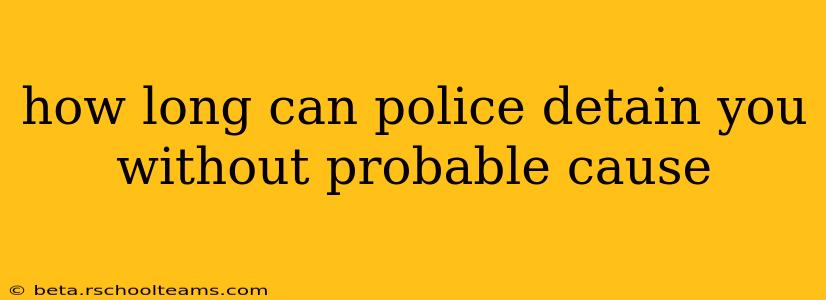The question of how long police can detain you without probable cause is a crucial one, impacting your fundamental rights. The answer, unfortunately, isn't a simple number of hours or minutes. The legality of a detention without probable cause hinges on several factors, and knowing your rights is paramount. This post will explore the intricacies of lawful and unlawful detentions, helping you understand your position should you ever find yourself in such a situation.
What Constitutes a Detention?
Before diving into time limits, let's clarify what constitutes a police detention. A detention occurs when a reasonable person wouldn't feel free to leave. This isn't limited to handcuffs; it includes being physically stopped, verbally restrained, or implicitly prevented from moving on. Factors considered include the officer's tone, commands, and the overall circumstances.
How Long is a "Reasonable" Terry Stop?
A brief detention, known as a "Terry Stop," is permissible under the Fourth Amendment if the officer has reasonable suspicion of criminal activity. Reasonable suspicion is a lower standard than probable cause, requiring only a reasonable belief that criminal activity might be afoot. A Terry Stop should be brief—long enough to investigate the suspicion and no longer. The courts haven't defined a precise timeframe, but excessively lengthy Terry Stops are grounds for legal challenge. The key here is the reasonableness of the duration based on the circumstances. Did the officer act diligently? Was the investigation efficient? These are questions the courts will consider.
What About Detentions Without Reasonable Suspicion?
Detentions without even reasonable suspicion are generally unlawful. The Fourth Amendment protects against unreasonable searches and seizures, and an arbitrary detention violates this protection. If you are detained without any justification, your rights are being violated.
What Happens if Police Detain You Unlawfully?
If you believe you've been unlawfully detained, remember the following:
- Remain calm and polite: This doesn't mean you must cooperate if you feel your rights are being violated, but remaining calm helps avoid escalating the situation.
- Ask why you're being detained: Inquire about the reason for the detention and the officer's legal basis.
- Assert your right to remain silent: You are not obligated to answer any questions beyond providing your name and address (even this can be debated depending on jurisdiction and circumstances).
- Document the event: If possible, note the time, location, officers' names and badge numbers, and any other relevant details.
- Seek legal counsel: Consult with an attorney as soon as possible.
What if the Police Have a Warrant?
If police have a valid warrant for your arrest, they can detain you. A warrant indicates that a judge has found probable cause to believe you committed a crime. Your detention in this instance is lawful.
Can the Police Extend a Detention Based on Information Gathered During the Stop?
While a Terry Stop is based on initial reasonable suspicion, officers can extend the detention if they gather further information during the stop that elevates the suspicion to probable cause. This requires the new information to be substantial and credible. A simple hunch stemming from the initial stop isn't enough.
Is there a specific time limit for police detention without probable cause?
There's no single, universally applicable time limit. The legality depends on whether reasonable suspicion exists and whether the investigation is conducted reasonably and efficiently. Excessively long detentions without probable cause are unlawful.
This information is for educational purposes only and does not constitute legal advice. If you have questions about a specific situation, consult with a qualified legal professional.
